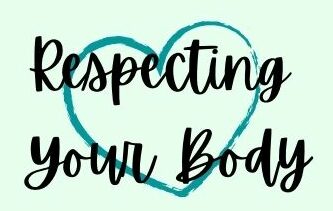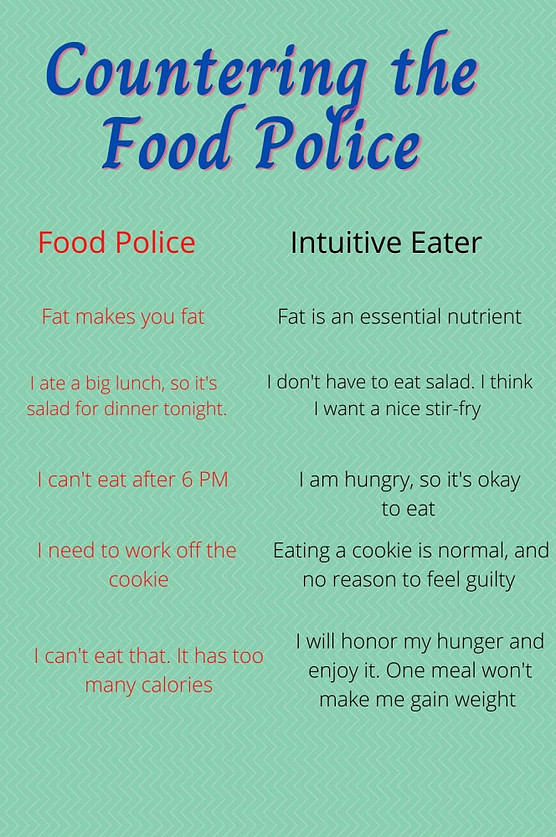Once you have begun to make peace with food, it is time to learn how to challenge the food police. Your inner food police has a profound effect on how you interact with and respond to food, often negatively. Before we get into how to combat this, we need to go over what the food police is and why it affects you.
If you have not read the first 3 steps yet, you might want to start here.
What Is The Food Police
The food police is an inner voice that we all have. It is the inner dialogue that judges and criticizes your food choices, when you eat, how you eat, and how much you eat. Society and diet culture tend to have a strong influence over the food police.
The thoughts you have about junk foods or desserts being bad for you, the feeling that you are a failure for giving into your cravings yesterday, and the voice that tells you that you must exercise more or eat better tomorrow today to make up for it, this is the food police.
We are not born with a strong and well-developed inner food police. However, many of us are raised in diet culture and are taught what foods we should eat and what foods are bad. Sometimes, it is very direct (i.e. “sugar is bad for you” Be good and eat your vegetables, etc), and, in some instances, it can be more subtle, such as ads mentioning guilt-free pasta dishes or cookies. These messages from family members, friends, school, television, social media, and more influence how we view food and strengthen our inner food police.
Why The Food Police Is Harmful
Why is this voice that tells you what is good and bad actually harmful? The food police is a form of negative self-talk that is irrational and damages your self-esteem, body image, and relationship with food. You wouldn’t think a toddler was good for eating salads all the time and losing weight, nor would you think they were bad for having seconds at dinner or enjoying dessert. Yet, the food police makes these judgments about you and your food choices.
Everyone says these things and you may have grown up believing them, but that doesn’t make it true or right.
When you feel like you should only eat what is “healthy” to be good or lose weight, that starts a cycle of deprivation that will only lead to binge eating and guilt or nutrient deficiencies. How is that good for you?
Food policing may appear to be helpful on the surface, but it really does not serve our best interests and can be very emotionally and physically damaging. That is why it is important to challenge the food police.
How To Combat The Food Police
In order to fight the food police and change your inner dialogue, you have to pay attention and recognize when the food police is talking. When you find yourself feeling guilty or engaging in black and white or negative thinking about food, it is time to reflect and figure out why. Most of the time, you will find that the food police is hard at work with its irrational thoughts going through your head.
How do you stop the food police thought? Counter it.
Once you have identified the food policing, challenge it with a rational rebuttal. If you find yourself thinking, “I shouldn’t have eaten that brownie. It was so rich and chocolaty that I am bound to gain weight if I don’t work out more this week!”, realize that is not rational or productive thinking, and it is the food police talking. Tell yourself that you will not gain weight or wreck your life from eating a brownie. It is okay to enjoy a brownie when you want one. You can exercise later if you want to do so for your own enjoyment or to support your body in a good way, not as punishment for making a normal food choice.
The image at the beginning of this section provided more examples of common food police thoughts and how to challenge them.
Returning To Intuitive Eating
Now you know how to identify food police thoughts and challenge them. With practice, you will be able to shut down these thoughts before they can have an effect on you. Imagine how freeing eating what your body is requesting will become.
Challenging and silencing the food police is one of the most important steps to a successful switch to intuitive eating. It will allow you to make peace with food on a deeper level and eat the way that is intuitive and natural for your body without judgment. This will give you the opportunity to feel your fullness and discover the satisfaction factor, which are the next steps of the intuitive eating process.
Do you have questions? Have you experienced any food police thoughts that you want to talk about? Please share with us in the comments!



My food police started suggesting me things that were rational. Emphasizing the importance of fruits, vegetables, whole grains, milk and fat-free or low-fat dairy products. I love seafood, lean meats, eggs, legumes (beans and peas), soy products, nuts and seeds. But I knew I should stop this inner voice when it started questioning me eating seafood and soy products.
I’m glad you recognized that the voice was no longer helping you when it made you question seafood and soy. As long as you like them and feel good eating them, that’s what matters.
That is an excellent way of thinking. I totally agree with the concept of challenging the food police, which for so long has had a negative influence on peoples food choices, making them almost fearful of eating something unhealthy, and the belief they should burn off excess calories almost as a duty.
Yes I agree. The food police really can make people fearful of eating foods. I used to be that way, especially with ice cream. I was afraid if I bought more than 1 serving, I’d eat too much and gain weight. Thanks to intuitive eating, I can keep ice cream around and not be scared of bingeing on it
Hey, thanks for the insights. I can’t remember ever hearing this term. I must live under a rock I guess, but you are right though. We often let society and “our norm” govern how we live our lives.
Our inner food policy can be harmful to us if we always listen it. Not everything you feel it’s bad for you or verce versa. Sometimes it can be good though and saves you from things.
Healthy food can differ from society to society, so it can confuse people. I also think it’s from individual to individual. What’s good for that person is not good for you because of maybe your health condition.
So, it’s important to balance it.
Thanks. I agree that what is good and healthy for the body varies from person to person.